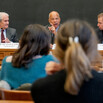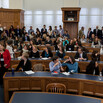Kim Lane Scheppele Discusses Europe’s Moral Crisis
On October 28, Professor Kim Lane Scheppele, Laurance S. Rockefeller Professor of Sociology and International Affairs in the Woodrow Wilson School and the University Center for Human Values at Princeton University, visited the Schell Center’s Human Rights Workshop.
The European Union was forged in the aftermath of the Second World War with the aim of avoiding future conflicts by creating economic interdependence within the Union. Guided by a series of core values: human dignity, freedom, democracy, equality, the rule of law and respect for human rights, the EU presents itself as a beacon of human rights on the global scene. But “looks can be deceiving” according to Professor Kim Scheppele.
Professor Scheppele began her talk by arguing current human rights norms are failing to provide protection against a different pattern of state abuse. She argued, “the abuse we’re seeing now is different to what the human rights community is used to, we’re seeing a new form of authoritarianism.”
Scheppele’s talk focused on this new form of authoritarianism, with discussion centering on current events in Hungary and Poland. According to Scheppele, at the core of a new form of state violence are leaders who are winning democratic elections, appealing to demographics that believe that their country has fallen into decline. Leaders are coming to power through “populist platforms as a strategy of rule.” Professor Scheppele’s discussion outlined how authoritarians are looking at Hungary and Prime Minister Viktor Orbáns tactics as “a set of tools,” with Egypt copying strategies to similarly weaken the judicial branch of government.
In the case of Hungary, Scheppele outlined how the Hungarian Prime Minister used a super majority to push through constitutional amendments and attack the legal system. Party loyalists were put into key legal positions; the number of parliamentary seats was cut, judicial age lowered, and appointment system reformed. This new authoritarianism poses problems for the human rights community, as “it doesn’t involve massive human rights violations.” Instead, “opportunities are locked down and power is consolidated so it no longer rotates.”
In the face of authoritarianism, Professor Scheppele questioned whether there is a right to live in a country with democratic rights. Within Europe, there are no mechanisms that hold states accountable to democratic standards once a country has joined the Union. Scheppele emphasized that this is a challenge that goes beyond the European Union, “new authoritarians don’t share a left or right ideology; they share an interest in blocking transnationalism.”


